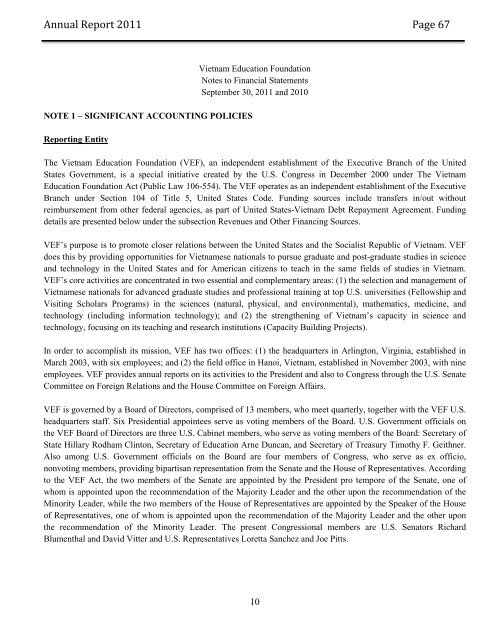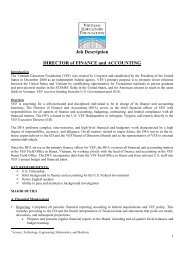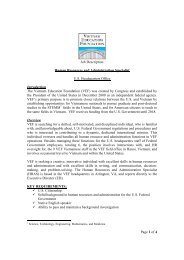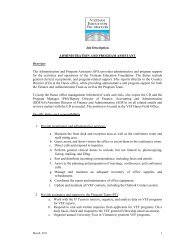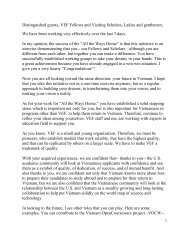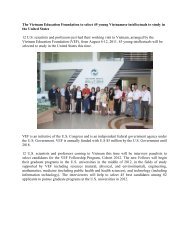The Vietnam Education Foundation 2011 Annual Report
The Vietnam Education Foundation 2011 Annual Report
The Vietnam Education Foundation 2011 Annual Report
Create successful ePaper yourself
Turn your PDF publications into a flip-book with our unique Google optimized e-Paper software.
<strong>Annual</strong> <strong>Report</strong> <strong>2011</strong> Page 67<br />
NOTE 1 – SIGNIFICANT ACCOUNTING POLICIES<br />
<strong>Report</strong>ing Entity<br />
<strong>Vietnam</strong> <strong>Education</strong> <strong>Foundation</strong><br />
Notes to Financial Statements<br />
September 30, <strong>2011</strong> and 2010<br />
<strong>The</strong> <strong>Vietnam</strong> <strong>Education</strong> <strong>Foundation</strong> (VEF), an independent establishment of the Executive Branch of the United<br />
States Government, is a special initiative created by the U.S. Congress in December 2000 under <strong>The</strong> <strong>Vietnam</strong><br />
<strong>Education</strong> <strong>Foundation</strong> Act (Public Law 106-554). <strong>The</strong> VEF operates as an independent establishment of the Executive<br />
Branch under Section 104 of Title 5, United States Code. Funding sources include transfers in/out without<br />
reimbursement from other federal agencies, as part of United States-<strong>Vietnam</strong> Debt Repayment Agreement. Funding<br />
details are presented below under the subsection Revenues and Other Financing Sources.<br />
VEF’s purpose is to promote closer relations between the United States and the Socialist Republic of <strong>Vietnam</strong>. VEF<br />
does this by providing opportunities for <strong>Vietnam</strong>ese nationals to pursue graduate and post-graduate studies in science<br />
and technology in the United States and for American citizens to teach in the same fields of studies in <strong>Vietnam</strong>.<br />
VEF’s core activities are concentrated in two essential and complementary areas: (1) the selection and management of<br />
<strong>Vietnam</strong>ese nationals for advanced graduate studies and professional training at top U.S. universities (Fellowship and<br />
Visiting Scholars Programs) in the sciences (natural, physical, and environmental), mathematics, medicine, and<br />
technology (including information technology); and (2) the strengthening of <strong>Vietnam</strong>’s capacity in science and<br />
technology, focusing on its teaching and research institutions (Capacity Building Projects).<br />
In order to accomplish its mission, VEF has two offices: (1) the headquarters in Arlington, Virginia, established in<br />
March 2003, with six employees; and (2) the field office in Hanoi, <strong>Vietnam</strong>, established in November 2003, with nine<br />
employees. VEF provides annual reports on its activities to the President and also to Congress through the U.S. Senate<br />
Committee on Foreign Relations and the House Committee on Foreign Affairs.<br />
VEF is governed by a Board of Directors, comprised of 13 members, who meet quarterly, together with the VEF U.S.<br />
headquarters staff. Six Presidential appointees serve as voting members of the Board. U.S. Government officials on<br />
the VEF Board of Directors are three U.S. Cabinet members, who serve as voting members of the Board: Secretary of<br />
State Hillary Rodham Clinton, Secretary of <strong>Education</strong> Arne Duncan, and Secretary of Treasury Timothy F. Geithner.<br />
Also among U.S. Government officials on the Board are four members of Congress, who serve as ex officio,<br />
nonvoting members, providing bipartisan representation from the Senate and the House of Representatives. According<br />
to the VEF Act, the two members of the Senate are appointed by the President pro tempore of the Senate, one of<br />
whom is appointed upon the recommendation of the Majority Leader and the other upon the recommendation of the<br />
Minority Leader, while the two members of the House of Representatives are appointed by the Speaker of the House<br />
of Representatives, one of whom is appointed upon the recommendation of the Majority Leader and the other upon<br />
the recommendation of the Minority Leader. <strong>The</strong> present Congressional members are U.S. Senators Richard<br />
Blumenthal and David Vitter and U.S. Representatives Loretta Sanchez and Joe Pitts.<br />
10


